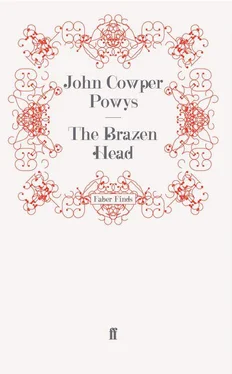Lady Val’s whole face twitched and her fingers clasped and unclasped the brooch at her waist. And then, as she gazed at this tricked-out image of youthful conceit, who was talking to her about the vindictiveness — and didn’t she know intricacies of that underground stream well enough! — of her rival at Cone, there suddenly whirled up within her the blindest and most desperate wave of emotion she had ever felt in her life.
Her own mind, as it grew aware of what she felt, interpreted it as pure unmitigated and entirely justifiable indignation with Lady Ulanda of Cone, but in reality it was far more complicated. It was compounded of an intense revolt against the way fate had been treating her of late, mingled with a wild longing that her children’s Dormaquil blood might suddenly assert itself and turn the whole tide of events in a completely new direction. Under the pressure of this surge of emotion, in the flood of which so many long pent-up feelings were breaking loose, she felt as though at any moment she might easily do something unexpectedly violent. It was an emotion too general, as well as too blind, to be fully interpreted by the simple definition “hatred of Lady Ulanda”, but as the thing uncoiled itself from the deepest centre of her being she began to be afraid of what she might do.
Lady Val had very rarely been as conscious of her personal inner life as she was at this moment. The sudden loosening within her of this long dammed up reservoir of suppressed fury forced the torrent of emotion into a psychic channel that so far had been left high and dry. She very rarely thought of herself at all when she was angry with Sir Mort or with Tilton or John; and in Lil-Umbra’s case she was so used to associating her daughter’s personality with her own that, when she got angry with her, it was like her right hand getting angry with her left hand.
Anger with Lil-Umbra was indeed a unique feeling, too deep-rooted to be easily articulated. But what she felt at this particular moment was a wild identification of herself with the very substance of the great house in which she lived. She felt as if she herself were the Fortress of Roque, and that every stone, every carving, every buttress, every arrow-slit, every stair, every tower, every wall, every rafter, every gate, every door, every threshold to every door, of this whole old place was calling out from within herself to herself, and reminding her that they and she together were a living part and portion of the diffused presence of the spirits of all her ancestors.
She suddenly felt that the whole place, which was herself and yet much more than herself, was being threatened by her and her children with a ghastly doom, a doom irretrievable, inescapable, and final. She told herself that it was she and none other who had brought this doom upon them all; and that she had done it by yielding to her love for Sir Mort and letting him be the father of her children.
As with most of us at some desperate climax of our lives, the wild passion of anger, which had driven this tragic awareness into an inner chamber of her consciousness, changed its own nature when it had achieved this end. It was a strange sadness that now filled Lady Val’s soul, as she thought of this fatal name “Abyssum” drifting and floating and flowing across every surface and through every crevice and crack of the massive stones whereof the Fortress of Roque was built.
“He is too queer, too eccentric, too remote from real life,” she told herself, “to be able to save this place and to guard our name from oblivion.”
It was as if the agitated lady’s soul had been whirling round the outside of the Fortress as violently as it had whirled round the inside, for it happened at that moment that a single dead alder-leaf, stirred up from the bank of a small stream in the direction of Cone Castle, and wafted through one of the arrow-slit windows in some higher portion of the Fortress, came floating down to the floor of that ante-room.
Where the dead leaf fell, there did it rest; and it rested on the ground almost mid-way between the comically pretentious young knight and the desperately agitated lady of the house. Whether either of them noticed this wrinkled symbol of the passing generations, as it fell between them, neither of them later would have been able to say. Very likely they both did, but without any reaction capable of being recalled.
Situations like this, when two human beings are brought together by fate, one of them in a state of feverish mental activity and the other in a state of complacent quiescence, one of them with nerves quivering and senses vibrant, and the other with both nerves and senses lulled into a trance of self-satisfaction, have the effect sometimes of putting very queer thoughts into the mind of one or other of the pair.
What came into the head of Lady Val at that moment was a fantastic theory of her husband’s about which he was in the habit of expatiating at great length and upon the most inopportune occasions. Sir Mort’s theory was — and though he would swear to her and to the children that it was based on his own experience, she never could see, however excited he got about it, that it was possible for one man’s experience to cover such an immense field — that there was what he was pleased to describe as an invisible Dimension that existed over the whole surface of land and sea; and that into this Dimension rushed all the thoughts and feelings and passions and even sensations of everything that was subject to these things.
His theory culminated in the amazing dogma that everything that existed had such feelings, not even excluding rocks and stones and earth-mould. And he further held that this invisible Dimension was much more crowded and much more active at certain geographical points round the surface of land and water than at others. Even where there are no human beings, this spiritual atmosphere would, he maintained, be there just the same. For not only must there be, universally emanating from the whole body of our planet, feelings that we must think of as the feelings of our Mother the Earth herself, but there must also be the feelings — or semi-conscious vibrations corresponding to feelings — of all the separate material elements whereof the substance of the planet is composed.
In fact Sir Mort insisted that all the feelings of all the things in the world are to be found in this invisible Dimension, and the fact that the earth as the earth has universal feelings does not mean that the separate parts and diverse substances of which she is composed are lacking in individual feelings. In fact he insisted that this invisible Dimension, or atmospheric sounding-board, of the planet upon which we live, while predominant in it are the feelings of all living men, women, and children, includes also the feelings of all beasts, birds, fishes, reptiles, insects and worms as well as of trees, plants, mosses, funguses, grasses and all vegetation.
And when we thus speak of the projected thoughts and feelings and emotions of all things, it must be remembered that we are not suggesting the existence of any actual souls that can survive the death of their bodily presence. When we are dead, Sir Mort maintained, we are absolutely dead. But while we live we are all, including the myriads of sub-human lives in air, on land, and in water, from whales to earth-worms and the tiniest gnats, in constant contact with an invisible overshadowing atmospheric mist, crowded with feelings and dreams and emotions and what might be called sense-emanations and thought-eidola issuing from all that exists, whether superhuman, human, or sub-human, whether organic or inorganic. This atmospheric dimension does not, Sir Mort argued, contain the sort of entities we are in the habit of thinking of as souls; for these perish when we perish, but it contains the thoughts and feelings and intimations and sensations which, though they grow fainter with time, do not cease to exist when the body and soul which projected them have both come to an end.
Читать дальше











